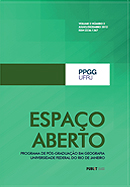The National Curricular Regulations of Geography and the Investigation, at School, of Processes Inherent to Geographic Situations
DOI:
https://doi.org/10.36403/espacoaberto.2023.57377Keywords:
Geographic Reasoning, Spatial Thinking, Pedagogical Turn, Geographic Analysis, Methodological GuidelinesAbstract
In this article, we present and discuss the problem related to the systemic teaching of Geography at school, with an emphasis on the relevance of investigating geographical situations. In order to meet this objective, we used a theoretical-methodological contribution developed by educational science regarding spatial thinking and geographical reasoning, seeking their differences and convergences. The analysis of current national regulations, here methodologically conducted according to the principles of Grounded Theory, indicates that the Brazilian curriculum of Geography, by prescribing the geographical situation as a methodological resource, is aligned with teaching-learning based on the relational space and the development of a Geography systemic. However, the national curriculum still needs greater investments aimed at clarifying obscure aspects that, once overcome, could encourage, at school, a successful pedagogical practice capable of promoting a pedagogical turn that distances the teaching of Geography from its current mnemonic and encyclopedic character.
Metrics
Downloads
Published
How to Cite
Issue
Section
License
Copyright (c) 2023 Lucio Antonio Leite Alvarenga Botelho, Roberto Célio Valadão

This work is licensed under a Creative Commons Attribution-NonCommercial-ShareAlike 4.0 International License.


